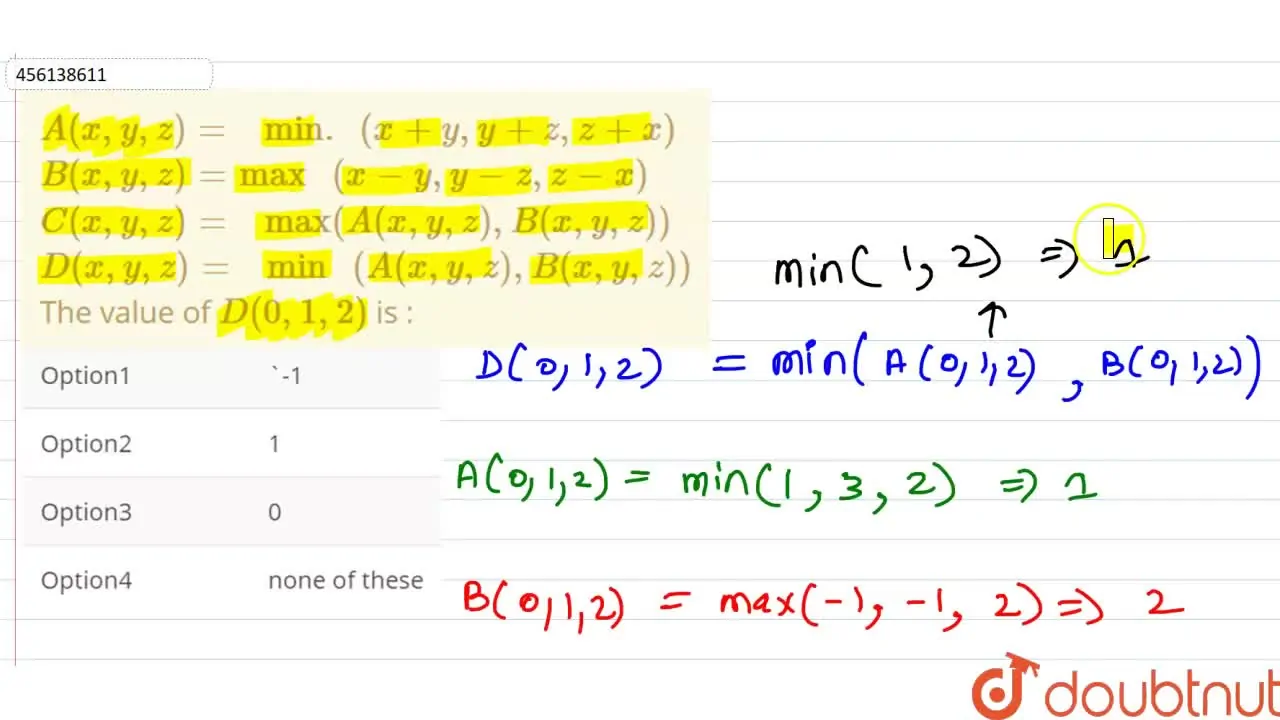A(x,y,z)= min. (x+y,y+z,z+x)
B(x,y,z)=max (x−y,y−z,z−x)
C(x,y,z)= max(A(x,y,z),B(x,y,z))
D(x,y,z)= min (A(x,y,z),B(x,y,z))
The value of D(0,1,2) is :
-1
1
0
none of these
The correct Answer is:B
Step by step video, text & image solution for A(x, y, z)=" min. "(x+y, y+z, z+x) B(x, y, z)="max "(x-y, y-z, z-x) C(x, y, z)=" max"(A(x, y, z), B(x, y, z)) D(x, y, z)=" min "(A(x, y, z), B(x, y, z)) The value of D(0, 1, 2) is : by Maths experts to help you in doubts & scoring excellent marks in Class 14 exams.
Related Playlists
- BOOK - ARIHANT SSCCHAPTER - FUNCTIONS AND GRAPHEXERCISE - EXERCISE(LEVEL 2)48videos
FUNCTIONS AND GRAPH
- BOOK - ARIHANT SSCCHAPTER - FUNCTIONS AND GRAPHEXERCISE - Final Round40videos
FUNCTIONS AND GRAPH
- BOOK - ARIHANT SSCCHAPTER - FUNCTIONS AND GRAPHEXERCISE - INTRODUCTORY EXERCISE - 17.317videos
FUNCTIONS AND GRAPH
- BOOK - ARIHANT SSCCHAPTER - ELEMENTS OF ALGEBRAEXERCISE - EXERCISE(LEVEL 1)32videos
ELEMENTS OF ALGEBRA
- BOOK - ARIHANT SSCCHAPTER - FUNDAMENTALS EXERCISE - TEST OF YOU - LEARNING - 240videos
FUNDAMENTALS
Similar Questions
A(x,y,z)= min. (x+y,y+z,z+x)
B(x,y,z)=max (x−y,y−z,z−x)
C(x,y,z)= max(A(x,y,z),B(x,y,z))
D(x,y,z)= min (A(x,y,z),B(x,y,z))
The value of C(1,2,3) is :View SolutionA(x,y,z)= min. (x+y,y+z,z+x)
B(x,y,z)=max (x−y,y−z,z−x)
C(x,y,z)= max(A(x,y,z),B(x,y,z))
D(x,y,z)= min (A(x,y,z),B(x,y,z))
Whgat is the value D(1,2,C(0,1,2))?View SolutionA(x,y,z)= min. (x+y,y+z,z+x)
B(x,y,z)=max (x−y,y−z,z−x)
C(x,y,z)= max(A(x,y,z),B(x,y,z))
D(x,y,z)= min (A(x,y,z),B(x,y,z))
What is the value of C(0,1,D(1,2,3))?View SolutionA(x,y,z)= min. (x+y,y+z,z+x)
B(x,y,z)=max (x−y,y−z,z−x)
C(x,y,z)= max(A(x,y,z),B(x,y,z))
D(x,y,z)= min (A(x,y,z),B(x,y,z))
What is the value of A(2,3,4)+B(2,3,4)?View SolutionA(x,y,z)= min. (x+y,y+z,z+x)
B(x,y,z)=max (x−y,y−z,z−x)
C(x,y,z)= max(A(x,y,z),B(x,y,z))
D(x,y,z)= min (A(x,y,z),B(x,y,z))
Whgat is the value D(1,2,C(0,1,2))?View SolutionA(x,y,z)= min. (x+y,y+z,z+x)
B(x,y,z)=max (x−y,y−z,z−x)
C(x,y,z)= max(A(x,y,z),B(x,y,z))
D(x,y,z)= min (A(x,y,z),B(x,y,z))
The value of C(1,2,3) is :View SolutionA(x,y,z)= min. (x+y,y+z,z+x)
B(x,y,z)=max (x−y,y−z,z−x)
C(x,y,z)= max(A(x,y,z),B(x,y,z))
D(x,y,z)= min (A(x,y,z),B(x,y,z))
Whgat is the value D(1,2,C(0,1,2))?View SolutionA(x,y,z)= min. (x+y,y+z,z+x)
B(x,y,z)=max (x−y,y−z,z−x)
C(x,y,z)= max(A(x,y,z),B(x,y,z))
D(x,y,z)= min (A(x,y,z),B(x,y,z))
What is the value of A(2,3,4)+B(2,3,4)?View SolutionFind the value of f(f(−3)),iff(x)=x+1x
View Solutionfind the value of f(5), if f(x)=3x2−4x ?
View Solution


